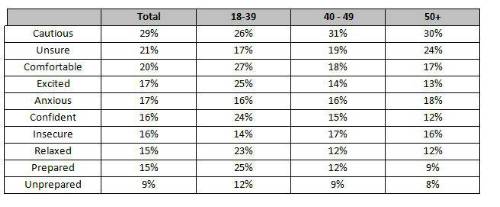Employee opinion is split on whether their organisation will increase automation in the next five years. Two in five (40%) say there are plans in place to do so, but an almost identical proportion (41%) say the opposite.
Two in five (44%) employees anticipate needing to learn new skills to adapt to increased automation. This rises to over half (52%) of workers over 60 – suggesting older workers are especially concerned about their skillsets becoming outdated because of widespread automation.
Nearly two in five (37%) employees expect that people will be replaced because of automation, while more than a quarter (28%) anticipate the trend will leave staff feeling less in control of their working lives. However, a third (33%) say job roles would more likely be redefined rather than replaced, and a fifth (21%) expect to become more productive as a result of automation.
Caution and uncertainty are common, particularly amongst older workers
Given concerns around skills and job replacement, it is perhaps unsurprising that caution (29%) is the most common feeling prompted among staff by the prospect of greater automation in the workplace. This is followed by uncertainty (21%); yet one in five (20%) are comfortable with the prospect of automation and 17% say they are excited about it.
There is a clear generational divide between older and younger workers when it comes to their comfort and confidence in the prospect of automation at work. Employees aged 50+ are more likely to feel cautious, unsure or unprepared than those aged under 40, and less likely to feel comfortable, excited, confident and prepared.
Table 1: Which of the following describes how the prospect of automation makes you feel?

Prospect of automation impacts staff health and wellbeing
More than half (56%) of employees say the prospect of greater automation affects their mental health in some way.
Of these, a third say it creates increased pressure to be ‘always on’ (34%). A similar proportion (32%) are concerned their job will fundamentally change as a result of automation, while 32% are anxious or worried about losing their job. A quarter (26%) are anxious they won’t be able to work with or understand new systems.
Meanwhile, almost one in five (17%) employees believe automation makes workers are less likely to take time off sick for fear of appearing replaceable.
If automation becomes more widespread, two in five workers (37%) say an Employee Assistance Programme would show them that their employer cares about their health and wellbeing. This is followed by income protection (31%), private healthcare (28%) and wellbeing perks (28%).
Paul Avis, Marketing Director, Canada Life Group Insurance, comments: “Automation is gradually become ingrained in the DNA of the workplace. While we tend to think about automation in terms of drastic changes like robotic assembly lines, it is more widespread and subtle than many realise.
“Employees are rightly cautious about its potential impact, with some already recognising it might redefine job roles or require staff to learn new skills. However, automation provides positive opportunities to improve productivity and the quality of our working lives.
“For this to be successful, employers must support their workforce during the transition to an increasingly automated workplace, particularly on matters of health and wellbeing. Employers should communicate clearly with their staff and tackle any fears head-on to ensure increased automation isn’t associated with constantly working and being ‘always on’.
“Support through Employee Assistance Programmes – provided with most Group Income Protection products – alongside other wellbeing benefits, can help to protect staff wellbeing during this complex transition period.”
|

